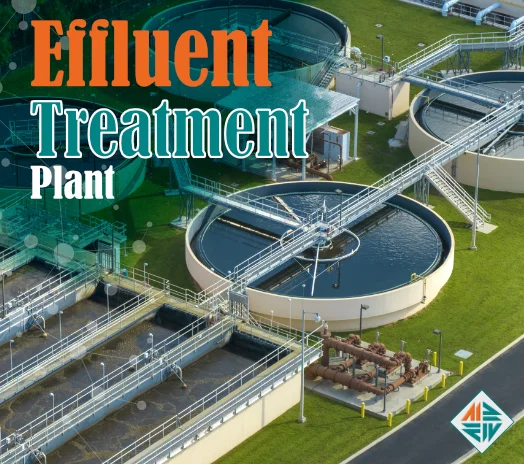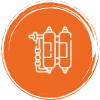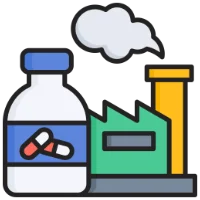Effluent Treatment Plant

Effluent Treatment Plants in India: Managing Environmental Impact Efficiently
Welcome to Maxwell Additives, where we unlock the potential of Effluent Treatment Plants (ETPs) and set the stage for environmental responsibility and sustainable water management. In this comprehensive resource, we dive deep into the world of ETPs, highlighting their paramount importance and showcasing how our specialized services can redefine your wastewater treatment processes. At Maxwell, we don't just deliver solutions; we deliver a greener, more sustainable future.
ETPs are the unsung heroes of responsible wastewater management. At Maxwell Additives, we recognize the critical role these plants play in purifying industrial wastewater, protecting the environment, and ensuring regulatory compliance. Our services are meticulously crafted to address the unique demands of your wastewater treatment needs.
INQUIRY NOWOur Product Range
Our Product Range
POLYMAN-HMA-279
An anionic polyelectrolyte, POLYMAN-HMA-279 serves as a potent antiscalant, effectively inhibiting scale formation in various industrial processes, ensuring uninterrupted operations and system efficiency.
POLYMAN-HMC-233
A cationic polyelectrolyte, POLYMAN-HMC-233 acts as an efficient antiscalant, preventing scale buildup in industrial systems. Its unique formulation helps maintain the integrity of equipment and enhance overall productivity.
POLYMAN-HMN-100
As a nonionic polyelectrolyte, POLYMAN-HMN-100 functions as a versatile antiscalant, providing reliable scale inhibition in diverse industrial applications. Its nonionic nature ensures compatibility with various systems, promoting long-lasting operational efficiency.
POLYMAN-254
An organic cationic coagulant and decolorizing agent, POLYMAN-254 efficiently facilitates water treatment processes, ensuring effective coagulation and removal of impurities, making it vital for wastewater treatment and purification systems.
POLYMAN-264
POLYMAN-264 is an organic cationic coagulant and decolorizing agent, adept at water treatment applications. Its unique formulation enables efficient coagulation and color removal, contributing to the purification of water and wastewater in various industrial processes.
OLKLIN-DF
A silicone defoaming agent, OLKLIN-DF efficiently tackles foam-related issues in industrial processes. Its silicone formulation provides effective foam suppression, ensuring smooth operations and process stability.
OLKLIN-DF-2
OLKLIN-DF-2 is a non-silicone and eco-friendly defoaming agent. This innovative solution addresses foam problems in industrial applications while adhering to environmental standards, making it a sustainable choice for foam control.
IMPORTANCE
Functions of Effluent Treatment Plant

Effluent Purification
ETPs remove pollutants and contaminants from industrial wastewater, ensuring it meets environmental standards before discharge.

Chemical and Biological Treatment
ETPs employ chemical and biological processes to break down harmful substances, making the effluent safe for the environment.

Water Recycling
ETPs facilitate water recycling within industries, reducing the demand on freshwater sources by treating and reusing wastewater for various processes.

Compliance and Monitoring
ETPs ensure industries adhere to regulatory requirements, monitoring effluent quality and ensuring compliance with local and national environmental standards.
Benifits of Effluent Treatment Plant
Clean Environment
ETPs protect nature by purifying industrial wastewater, preventing pollution.
Resource Savings
ETPs conserve water, reducing freshwater usage and promoting sustainable practices.
Public Health
Treated effluents ensure safe water, safeguarding community health from waterborne diseases.
Compliance
ETPs help businesses meet laws, avoiding penalties and fostering responsible operations.
Applications of Effluent Treatment Plant

Industrial Wastewater Treatment
ETPs purify wastewater from factories, removing pollutants before discharge.

Textile and Dyeing Industries
ETPs treat colored effluents, ensuring safe disposal and preventing water contamination.

Food and Beverage Sector
ETPs process organic waste, maintaining water quality standards in food production.

Chemical and Pharmaceutical Plants
ETPs neutralize and detoxify chemicals, preventing environmental harm.

Pulp and Paper Mills
ETPs remove lignin and chemicals, minimizing environmental impact from paper production.

Mining and Metal Industries
ETPs treat mining effluents, reducing heavy metal content for eco-friendly disposal.
Components of
an Effluent Treatment Plant
Understanding the anatomy of an ETP is essential for effective operation. At Maxwell Additives, we unravel the intricacies, detailing the components that make up an ETP and how they collaborate to deliver efficient wastewater treatment.

Working Principles of ETPs
Our commitment to your success extends beyond the surface; we offer an in-depth understanding of the working principles that drive ETPs. From chemical coagulation to biological degradation, our services are engineered to optimize your wastewater treatment processes.
Effluent Treatment Plant Maintenance
Effluent Treatment Plant maintenance is crucial to ensure continuous, efficient operation. Our services encompass ongoing support, monitoring, and preventive maintenance to extend the lifespan of your ETP.

FAQ's
An ETP is a facility designed to treat industrial wastewater, removing pollutants and contaminants to make it safe for discharge or reuse.
ETPs are crucial for industries to meet environmental regulations, prevent water pollution, and ensure sustainable water use.
ETPs use physical, chemical, and biological processes to remove impurities from wastewater, making it environmentally safe.
Industries such as textiles, chemicals, food processing, pharmaceuticals, and manufacturing require ETPs to treat their specific wastewater.
Yes, treated water from ETPs can often be reused for non-potable purposes like irrigation, cooling, or cleaning within the industry.
ETPs can remove various pollutants, including suspended solids, organic matter, chemicals, heavy metals, and pathogens.
Without an ETP, industries risk polluting water bodies, facing legal consequences, and harming the environment and public health.
Regular maintenance is essential to keep an ETP functioning efficiently. Maintenance frequency depends on the specific system and its usage.
Modern ETPs are designed to handle varying wastewater volumes, adapting to the needs of the industry for optimal efficiency.
Yes, ETP designs vary based on the industry type, the nature of pollutants, and local regulations, ensuring customized solutions for specific industrial needs.
